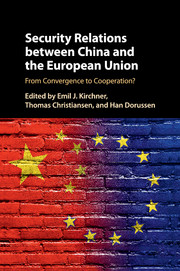Book contents
- Frontmatter
- Dedication
- Contents
- List of Tables
- Preface and Acknowledgements
- Abbreviations
- List of Contributors
- 1 EU–China Security Cooperation in Context
- 2 Chinese and EU Views of Military Security: Crafting Cooperation
- 3 Regional Solutions for Regional Confl icts? The EU, China and their Respective Neighborhoods
- 4 Aims versus Deeds: EU–China Cooperation in Nuclear Nonproliferation
- 5 Terrorism and Organized Crime: Common Concerns but Different Interests
- 6 Chinese and EU Climate and Energy Security Policy
- 7 Competing or Converging Claims on International Order? The EU, China and Human Security
- 8 Civil Protection: Identifying Opportunities for Collaboration
- 9 Cybersecurity and EU–China Relations
- 10 The Economic Security Dimension of the EU–China Relationship: Puzzles and Prospects
- 11 Is Securitizing Migration a Mandatory Choice? Lessons from the EU and China
- 12 Against the Odds: (Considerable) Convergence and (Limited) Cooperation in EU–China Security Relations
- Index
- References
9 - Cybersecurity and EU–China Relations
Published online by Cambridge University Press: 05 September 2016
- Frontmatter
- Dedication
- Contents
- List of Tables
- Preface and Acknowledgements
- Abbreviations
- List of Contributors
- 1 EU–China Security Cooperation in Context
- 2 Chinese and EU Views of Military Security: Crafting Cooperation
- 3 Regional Solutions for Regional Confl icts? The EU, China and their Respective Neighborhoods
- 4 Aims versus Deeds: EU–China Cooperation in Nuclear Nonproliferation
- 5 Terrorism and Organized Crime: Common Concerns but Different Interests
- 6 Chinese and EU Climate and Energy Security Policy
- 7 Competing or Converging Claims on International Order? The EU, China and Human Security
- 8 Civil Protection: Identifying Opportunities for Collaboration
- 9 Cybersecurity and EU–China Relations
- 10 The Economic Security Dimension of the EU–China Relationship: Puzzles and Prospects
- 11 Is Securitizing Migration a Mandatory Choice? Lessons from the EU and China
- 12 Against the Odds: (Considerable) Convergence and (Limited) Cooperation in EU–China Security Relations
- Index
- References
Summary
Security Threats Emanating from a Global Cyberspace
Compared to the increasing relevance of global cyberspace to the societal, commercial and military sectors in both the European Union and China, cybersecurity is the blind spot in the overall EU–China relationship. It was only in 2013 that the EU and China formally expressed a common general interest in cyberspace (EEAS 2013). At the same time, both actors, with differences in content, scope and timing, have developed their own approaches to cybersecurity and the respective threats they perceive in global cyberspace.
Cybersecurity policy has been on the radar of the EU for many years. It established the European Network and Information Security Agency in 2004 in order to facilitate a movement toward shared knowledge and improved “best” practice among EU member states. There was also a clear security (sub)dimension connected to the evolution of the EU's “information society” agenda. The issue was moved up the EU's political agenda in 2007, with NATO, the EU and other actors forced to radically rethink their approach following distributed denial of service (DDoS) attacks on Estonia's public and private infrastructure. Thus the EU's threat perception and vulnerability in relation to cybersecurity is connected to Europe's economic transformation, as well as the social and political consequences of cybercrime, attacks on information systems and protecting cyberspace in order to ensure its effective operation in military and civilian dimensions. Cyberspace, if not secured, from an EU perspective, threatens the very existence and evolution of all Europeans across social, economic and political realms.
The EU's policy has since developed and been underpinned by the need to achieve the objectives it has set for itself in its document on the digital agenda for Europe (European Commission 2010), and equally as significant, the driving force of such an agenda, the Europe 2020 strategy (EEAS 2013). In addition, it has recognized that, as a security issue, the protection of cyberspace is borderless, and it has highlighted these issues in its policy documents and internal security strategies, including a set of principles and guidelines for internet resilience and stability (European Commission 2011) and a cybersecurity strategy (European Commission 2013). Furthermore, it has recognized the importance of working in partnership with global partners to address the civilian and military aspects of cybersecurity challenges.
- Type
- Chapter
- Information
- Security Relations between China and the European UnionFrom Convergence to Cooperation?, pp. 167 - 186Publisher: Cambridge University PressPrint publication year: 2016
References
- 1
- Cited by



